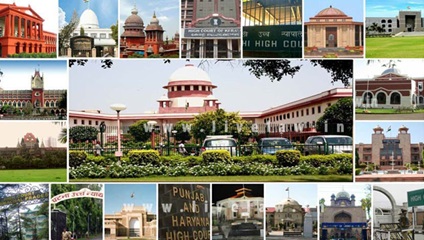Prelims: Indian Political System
Main: General Studies Paper-2: Structure, Organisation and Function of Judiciary- Ministries and Departments of Government |
Reference:
In view of the increasing number of criminal cases, the Supreme Court on January 30, 2025, has made some amendments in the conditions of appointment by allowing the High Courts to appoint retired judges on ad hoc basis.

Process of appointment of ad hoc judges:
- Article 224-A introduced by the Constitution (Fifteenth Amendment) Act, 1963 allows the appointment of retired judges in the High Courts on ad hoc basis.
- Such appointments require the consent of both the retired judge and the President of India. These judges receive allowances determined by the President's order.
- They enjoy the same jurisdiction, powers and privileges as a sitting judge of the High Court.
- Ad-hoc judges are appointed only in the High Courts. There is no provision or rule regarding their appointment in the Supreme and subordinate courts.
Detailed appointment process:
- When a retired judge gives his consent for the appointment, the name of the judge and the proposed tenure is submitted by the Chief Justice of the High Court to the Chief Minister of the state.
- The Chief Minister then sends the recommendation to the Governor who sends it to the Union Minister of Law and Justice.
- The Union Law Minister consults the Chief Justice for advice after which the recommendation is sent to the Prime Minister.
- The advice is then given by the Prime Minister to the President and the appointment is finalized after approval by the President.
- Finally the Chief Minister issues a formal notification in the Gazette of India.
Examples of appointments of ad hoc judges
- There have been only three instances of ad hoc judicial appointments in the history of the judiciary:
- Appointment of Justice Suraj Bhan to the Madhya Pradesh High Court in 1972 to decide election petitions soon after his retirement
- Appointment of Justice P. Venugopal to the Madras High Court in 1982
- Appointment of Justice O.P. Srivastava to the Allahabad High Court in 2007 to hear the Ayodhya land dispute
Rules laid down by the Supreme Court previously regarding ad hoc judges
- Related case: Lok Prahari through its General Secretary S.N. Shukla IAS (Retd.) v. Union of India (2021)
- In the Lok Prahari case, the Supreme Court has identified the following special circumstances requiring the appointment of ad hoc judges in High Courts:
- If the vacancies in a High Court exceed 20% of its sanctioned strength.
- If cases in a specific category are pending for more than 5 years.
- If more than 10% of the cases of the High Court are pending for more than 5 years.
- If the rate of disposal of cases is less than the rate of filing of new cases.
Recent Amendments in Appointment Conditions
- The Supreme Court has suspended the condition of appointment of ad hoc judges only when judicial vacancies are more than 20% of the sanctioned number.
- Now the Chief Justices of the High Courts can recommend the appointment of retired judges as ad hoc judges.
- However, ad hoc judges can hear only criminal appeals and they have to do so as part of a bench headed by a sitting judge.
- Earlier ad hoc judges could hear any type of appeal and could be part of different benches to deal with cases.
- The number of ad-hoc judges cannot exceed 10% of the sanctioned judicial strength of a High Court i.e. only 2 to 5 ad-hoc judges can be appointed in each High Court.
Reason for amendment by Supreme Court:
- As per the data of National Judicial Data Grid, as on 25th January, 2025, there are 62 lakh cases pending in all the High Courts.
- Out of these, more than 18.2 lakh are criminal cases while more than 44 lakh are civil cases.
- To deal with this increasing number of pending cases, the Court has decided to suspend the conditions laid down in the Lok Prahari case.



